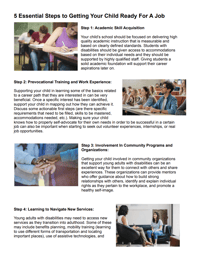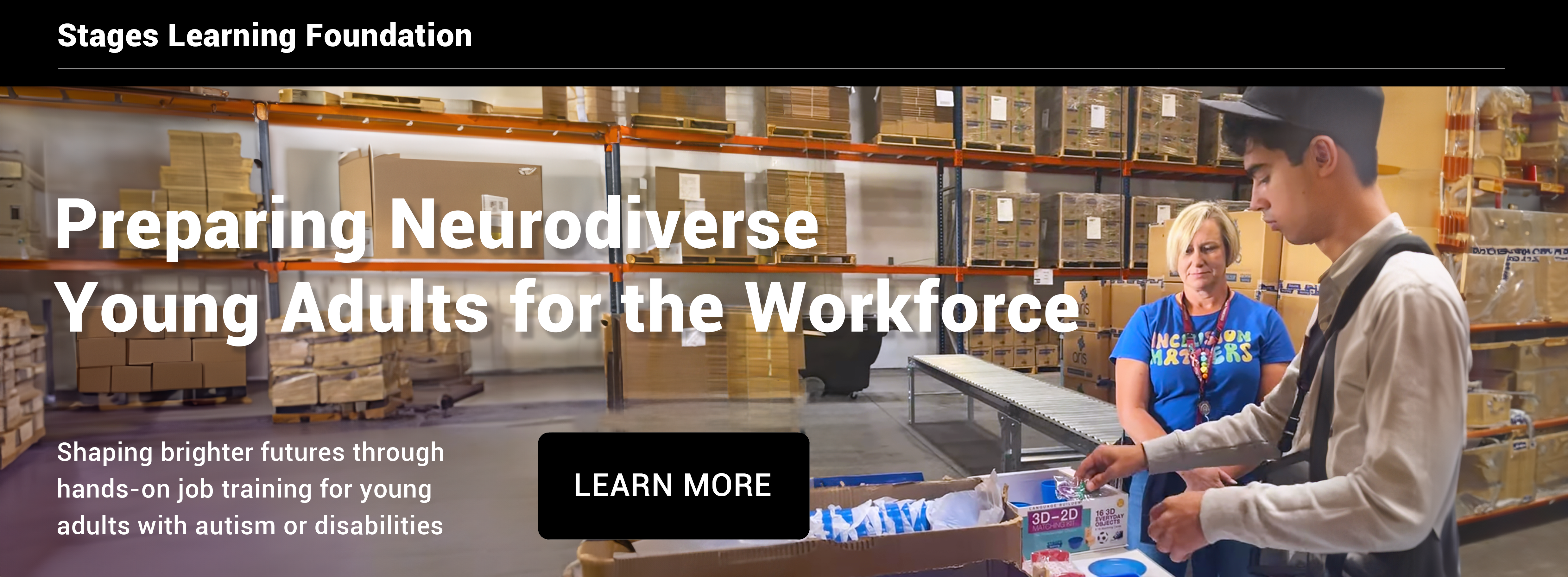A Former Job Coach Shares Her Experience Working With Autistic Children
What Is a Job Coach?
A job coach can provide guidance and initial support for a child when they begin to reach that transitional age and think about getting a job. Entering the workforce can be an intimidating yet exciting new prospect for anyone. For children with ASD, taking some time to plan ahead and teach some of the skills that will be crucial in their success, can ease the stress for both children and parents alike.
As a Special Education Teacher, I have worn many different hats throughout my career. I was very fortunate to get to work at an excellent Chapter 766 School that specializes in transitional and vocational training for students. The students that I worked with were on the autism spectrum and were between the ages of 14-22.

FREE Download: 5 Essential Steps to Getting Your Child Ready for a Job
As the Special Education Teacher for these students, I was in charge of writing individualized IEP goals and developing a functional and comprehensive curriculum for my students to follow. Much of what I taught was designed to directly correlate with the real-world experience that they would participate in. For example, one of my students, a 14-year-old, had a measurement goal in which he would be able to independently identify and measure different quantities. This was a chosen goal for him because we knew that he was interested in food services. This particular student was then able to practice this skill in the school’s kitchen until it was mastered. At that point, we were able to transition him to a volunteer opportunity at a local pizza restaurant.

In my role as job coach, I would go with my student to his new place of work and it was exciting for everyone involved. His parents were thrilled that he was getting some great experience at such a young age, and I was overjoyed to see him apply what he had learned in a real setting. As his job coach, I made sure that he stayed focused on his task and tried to do so as discreetly as possible. I would systematically provide more and more distance between him and myself so that he could be as independent as possible. It took some time, but I was eventually able to sit at a table at the back of the restaurant and just be within eyesight. His progress was truly an amazing sight to see and you could tell how proud he was of himself to have accomplished his goal.
Some Reasons Your Child Could Use a Job Coach
The skills that my student practiced before entering the job site definitely helped to prepare him, but there were also many other things that transpired that were more unexpected. I often found that my student needed additional coaching when it came to some of the “soft” skills that are involved with interacting with managers and coworkers. These were things that we discussed before starting the volunteer experience, but could really only be targeted once in the natural environment. Some examples of these soft skills include communication, flexibility, and empathy. I realized that my student could benefit from some coaching specifically related to responding to new people in his work environment. We worked on eye contact when someone was speaking, being flexible when things stray from the original plan, and thinking about how others might feel when you respond a certain way. These were all things that took time and practice, but as a job coach, I was able to pinpoint situations to replicate back at school so that we could have some “rehearsal” time.
As a parent, you can definitely still work with your child on your own to prepare them for the workforce. A good place to start might be with interview skills. In my experience, creating a mock interview with questions for your child to practice answering can help prepare them for a real interview. Practicing having good eye contact or using an appropriate handshake are all things that children with ASD may also need additional practice with. It can also be a good idea to discuss what your child’s interests are. This will help with motivation to get started working towards their goal.

Resources and Next Steps if Your Child Is Interested in Employment
1. Determine Interests and Skill Level
Your child might already show a strong affinity for a specific skill area, but if you are unsure where their interests lie, testing out different activities with them could be a good place to start. Some children with ASD can easily verbalize likes and dislikes. For these children, just having an open conversation and searching the internet for various open positions to get a sense of what is out there could get the ideas flowing.
For children who might need more visual support to help them communicate their likes and dislikes, there are vocational assessments that include pictures to help children with ASD point to the activity that they like best. For example, when given pictures of cleaning a countertop and bagging groceries, your child could point to the picture they like best to indicate their preference. There is also a great resource available from The Assessment of Functional Living Skills (AFLS), Vocational Skills Assessment Protocol by James W. Partington and Michael M. Mueller. Within this assessment, you will find excellent guides, questionnaires, and checklists to help determine your child’s current level of independence with various tasks and what skills they may need to work on in order to increase their independence.

2. Practice
Whether it is just in your own home or out in the community volunteering somewhere, encourage your child to practice the skills or activities that they are interested in. Building confidence early on can make a huge impact when your child is ready to venture out into a real job setting. Knowing the skill well and simulating the atmosphere that they could potentially be entering will allow your child to focus on the more unpredictable aspects that arise in a new environment. This also gives them the ability to cope with just the unexpected aspects rather than having to learn a new skill and face a new social challenge at the same time.
Talking to your child’s school and teachers about potential volunteer opportunities could also be an option depending on the type of school your child attends. Many sub-separate or life-skills-based classrooms will place a strong emphasis on vocational preparedness, but inclusion settings may also have additional resources available to support your child around age 14 when transition planning comes into focus.
3. Contact Local Autism Community Organizations
If you feel that your child would benefit from a job coach, reaching out to your school community could be a good place to start as they may have resources readily available depending on the setting. If your school does not have access to a job coach, search for a local autism community organization that will be able to offer you recommendations. The Arc is an organization for people with intellectual and developmental disabilities that focuses on promoting independence in the community. They have several chapters all across the United States which offer excellent programs, including employment training and placement.
Children with ASD can have very successful and fulfilling first employment opportunities with some planning and practice.
We would love to hear about your experiences. Has your child expressed interest in getting some type of job? How have you helped support that interest? (See the comment box at the end of this article to respond!)

Sara DeFronzo
Sara DeFronzo is a Kindergarten and First Grade Special Education Teacher from East Boston, Massachusetts. Sara has worked with children diagnosed with ASD for several years. She started as an in-home ABA behavior therapist in which she worked with newly diagnosed children and their families to increase independent living and communication skills. From there, Sara worked at an ABA based school working with children ages 5-22. Sara currently works with students with special needs in the inclusion setting. Sara enjoys the progress she is able to see her students make over the course of the year, and she loves to individualize instruction through the creation of new resources and materials. Sara has her M.Ed. in Severe Disabilities from Endicott College as well as her M.Ed. in Curriculum and Instruction from The University of Massachusetts Lowell.





